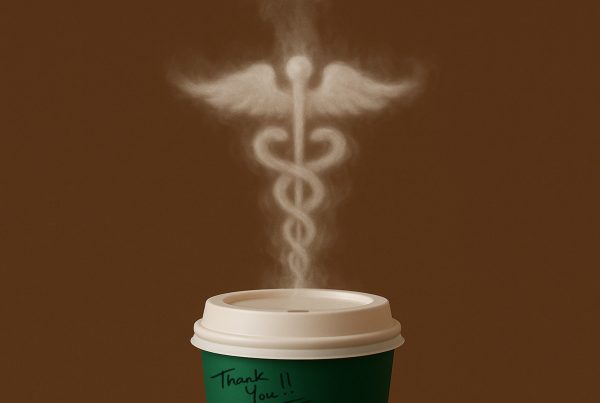The Big Story: In Brooklyn, the Anti-Met Gala Raises Funds for Medical Debt
“The Met Gala is vapid and silly. This is a better function, with a better message. I work in medicine and personally know how people can enter massive debt that ruins their lives.”
The High Cost of Debt
By David Jarrard
4-minute read
We were all invited to the Debt Gala.
Did you miss your invitation? It’s the darkly fun side-hustle to the Met Gala, the $75k-a-ticket celebrity soaked, click-bait fundraiser for the Metropolitan Museum of Art’s Costume Institute. Desperate attire. Fawning critiques. Recaps in Vogue, sponsored by Porsche.
Just across the East River was the Debt Gala, a $35-a-pop party where the proceeds go to relieve crushing medical debt, the financial burden carried by four in ten Americans and the financial worry causing people more stress than any other. More stress than paying for food, or gas or daycare.
Collective stress fuels frustration, anger and action. The Debt Gala is what a populist movement in healthcare looks like.
It’s a movement fed by the good hearted but massively inadequate GoFundMe campaigns to pay for someone’s ER visit, or by the change jar with some kid’s picture on it, sitting next to the cashier at the convenience store. Please help, it begs, asking for nickels for chemo.
What an embarrassment for our “system of health.”
It’s fed, too, by headlines such as “Hospitals Are Refusing to Do Surgeries Unless You Pay in Full First,” above Melanie Evans’ piece in this week’s WSJ.
“For years, hospitals and surgery centers waited to perform procedures before sending bills to patients,” Evans writes.
“Now, more hospitals and surgery centers are demanding patients pay in advance. Advance billing helps the facilities avoid hounding patients to settle up. Yet it is distressing patients who must come up with thousands of dollars while struggling with serious conditions. Those who can’t come up with the sums have been forced to put off procedures.”
You know the stats: One in six US adults say they are stuck in their job for fear of losing health insurance; nearly half say they or someone in their home has delayed care because of its cost – one in four in the past year; half say they would have to go into debt to pay an unexpected medical bill of $500.
The breathtaking cost of care – and the deep fear of being unable to afford it – is everywhere and is carried by most everyone, insured and uninsured, well-off and impoverished, old and young.
Given the recent campus protests, you’d be forgiven if you thought the conflict in the Middle East is the most important issue to college students today. Actually, it’s healthcare. Over Gaza, climate change and gun control, says a fresh survey of 1,250 students.
Medical debt is a political powder keg.
It’s propellant for politicians eager to serve their understandably anxious constituents. Want evidence? Just last Wednesday Sen. Bernie Sanders and progressive friends introduced a new bill to “cancel all medical debt.”
“New legislation from Sanders creates a program to cancel all existing patient debt and block creditors from collecting past medical bills,” says the Guardian, which also kindly notes, the “bill may face a difficult journey to passage in the Republican-controlled House.”
“No one in America should face financial ruin because of the outrageous cost of an unexpected medical emergency or a hospital stay,” Sanders said.
Politics is the art of the possible. The Sanders bill may not be possible, but it’s how things start. In this environment, pleas from the trillion-dollar healthcare industry for more money find a public less than receptive.
Savvy leaders know this well.
To outsiders worried most about their healthcare bill, the intramural battles waged between differing elements of the industry – providers vs. payers vs. pharma vs. government – can appear to be one well-funded segment wrestling with another over unimaginably large amounts of money.
You know the African proverb, “when elephants fight, it’s the grass that suffers”?
Guess who the elephants are.
Yes, we know. Leaders must dive deep into complex financial issues because untangling the Gordian Knot of healthcare funding is necessary to sustain the delivery of care. The basket of byzantine payment systems – 340B, site-neutral payment, etc. – must be carried carefully. Providers need everything in it.
Yet how can leaders engage effectively with a populist movement that seems unconcerned about what organizations within the system have the money or which needs more – only that people are being hurt by a system that’s supposed to heal?
Leaders must remember that patients and stakeholders are the heroes of the healthcare story. Your story.
Most people – patients, voters, consumers – care about an organization when it demonstrates that it knows them, cares about them and that the care provided matters to them.
Otherwise, it’s an impersonal “system of care” until patients experience it as a “person” who cares.
So, a few friendly reminders:
- Make sure your actions match your words. Table stakes on this issue are knowing your organization’s costs, charges and billing practices. If you’re using a collection agency, be damn sure they’re not taking things too far.
- Be upfront about costs. Whenever possible, tell a patient what they may owe before they come in for care. Send that text saying, “You have an appointment with X doctor on Y date. Your portion of the bill will be $Z.” Train front office staff to have conversations about patient finances and financial assistance.
- Partner with those who have a network and voice. Use the resources in your community – the United Way, churches, etc. – to teach people about health, healthcare and the services offered by your organization and others in the community to help offset the cost of care. Invest in communications to help people understand what care and resources are available to access and pay for it.
- Join the conversation. Find the opinion leaders, advocates and local officials taking the populist position. Sit down over coffee and have a conversation. They’re not the enemy, they’re just trying to figure out a way through a broken system. Offer authentic and transparent information about how your organization works – including the things you do to help patients access care and the areas where things don’t work as well as anyone would want.
This is hard, hand-to-hand, person-to-person work. It’s the steadfast work of growing grassroots support and nurturing advocates. You know the coffee rule.
There is one more step for healthcare leaders today: Bring a solution to the madness; a path forward. Convene healthcare leaders and patient advocates and employers to develop non-sectarian solutions to the crazy, unsustainable, politically unviable cost of care. Be a facilitator of the future.
What’s the risk of inaction? If you don’t have a realistic position to offer, one will be created for you – likely a solution you won’t like. Are you familiar with populism?
“Canceling medical debt is a common-sense position overwhelmingly supported by the American public,” says Sander’s press release introducing the debt relief bill last week.
“That support is nonpartisan with 84 percent of Republicans in favor of canceling it. In fact, when polled on which types of debt Americans would like to see forgiven, two-thirds of Americans pointed to medical debt.”
Seems reducing medical debt is a party everyone wants to attend.
The Debt Gala, you ask? The populist event raised a bit more than $15,000 to alleviate medical debt, estimated to total some $220 billion dollars. Eating the elephant one bite at a time, as they say. If you’re counting along at home, the other gala raised $26 million for the Met’s Costume Institute.
“The Met Gala is a fun cultural touchstone to be distracted by, but at the root of it, it is disconnected from the rest of the world,” event founder Molly Gaebe said. “It doesn’t symbolize wanting to better the world in any way. Social justice is at the heart of the Debt Gala.”
Social justice. Making healthcare better. That’s the job, right?
Consider this your invitation.
Contributors: David Shifrin, Emme Nelson Baxter
Image Credit: Shannon Threadgill




